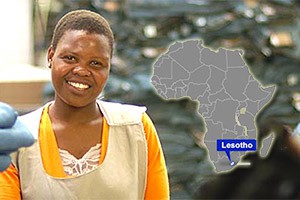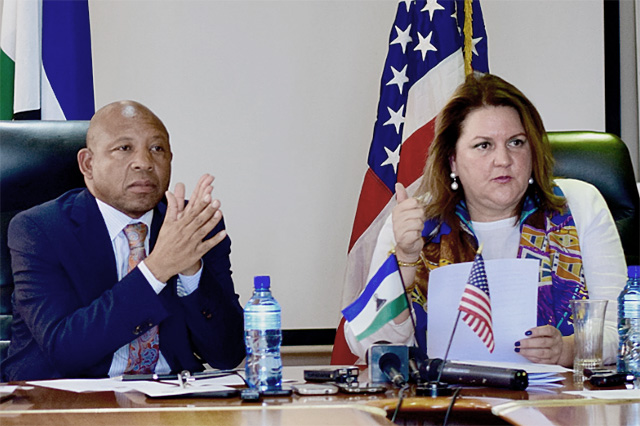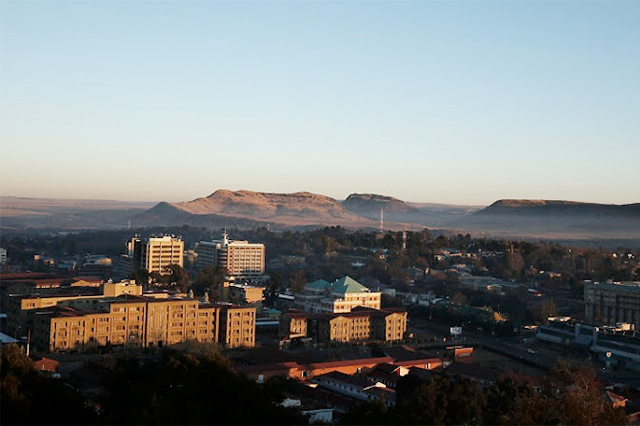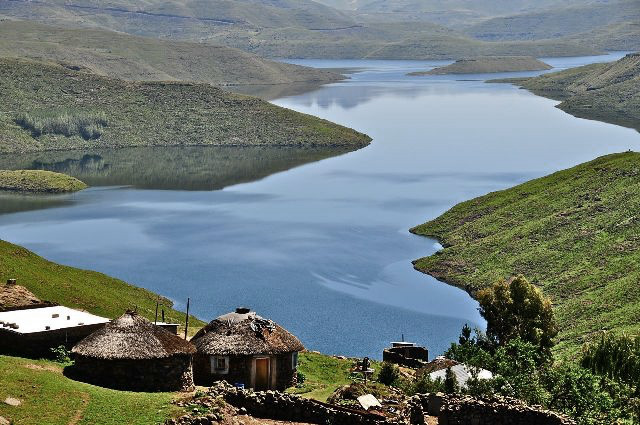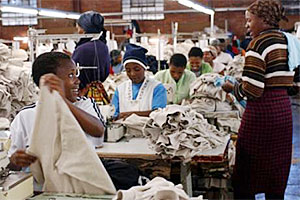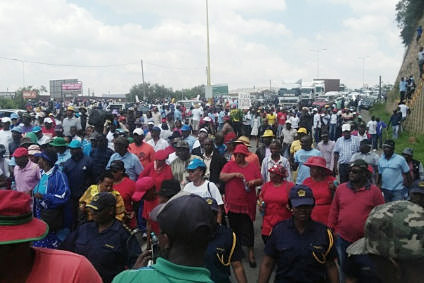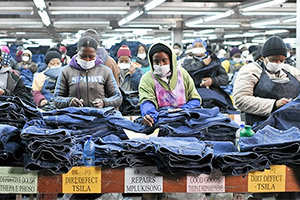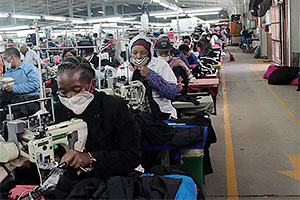Lesotho: 'The US finally did something right in Africa - and it's about to stop?'
For much of her childhood, Ntaoleng Moloi's father was like a ghost. He missed birthdays and first days of school, family jokes and first snows. Months and then whole seasons passed without his presence. It felt, at times, like he was thousands of feet below the surface of her life, somewhere dark and unreachable.
That's because, for much of the time, he was. Moloi's father was a gold miner, and like many men of his generation in Lesotho - the mountainous speck of a country surrounded on all sides by South Africa - his life was cleaved neatly down the center: In Lesotho was everything and everyone he loved. In neighboring South Africa was the money they all needed to survive.
"I don't know how he did that job; you have to be very brave," Moloi, who is 24, said recently outside the gates of the textile factory where she works in Lesotho's capital. "No, I do know, actually. Money talks."
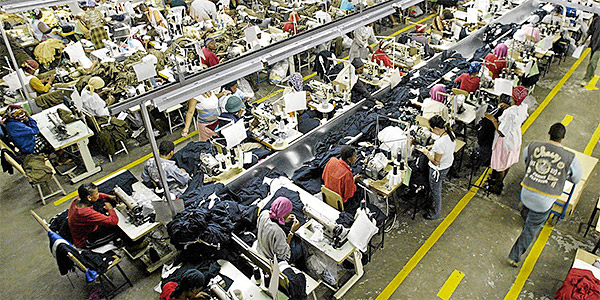
Money still talks just as loudly these days, of course, but Moloi's family is now reunited in Lesotho. That's thanks to an obscure American trade deal that has enabled the country's garment and textile industries to flourish, elevating a generation of young women like Moloi to the status of primary breadwinners and lessening the need for male relatives to seek dangerous work across the border in South Africa.
The trade deal, known as the African Growth and Opportunities Act (AGOA), has been a major economic boon for the people of Lesotho, especially the women who dominate factory floors. But it could soon become a casualty of the government's deteriorating record on human rights.
Because the government has failed to hold accountable the leaders of a 2014 attempted coup that turned violent, the U.S. Trade Representative could soon revoke Lesotho's eligibility for AGOA. (A decision is expected by Jan. 1.) That, says Lehlohonolo Chefa, executive director of the Policy Analysis and Research Institute of Lesotho (PARIL), would be catastrophic for tens of thousands of families like Moloi's who have benefitted from AGOA and bear no responsibility for their government's failures.
"As an activist, my first thought was that this industry is just exploitative [because of low wages], but it's quite dramatic how it's changed the lives of women here," says Chefa, who is currently leading a study of women in the country's garment industry. "When you look at whose actions will ultimately decide the fate of this deal, they're mostly men - in Maseru and Washington both - but if this deal goes they have little to lose. It's this country's women who will lose everything."
Signed into law by President Bill Clinton in 2000, AGOA has enabled some three-dozen African countries to sell a long list of goods - including oil, cars, and textiles - duty free in the United States. Part trade pact, part aid project, it was designed to help stitch some of the world's poorest countries into global markets they have long struggled to break into, and in so doing spur broad-based development.
In many ways, that mission has succeeded. Since 2001, non-oil exports from sub-Saharan Africa to the U.S. have tripled, from $1.4 billion to $4.1 billion. In the capital of Lesotho, apparel factories now crowd the industrial district, churning out sweatshirts and skinny jeans for American brands like Levis, Walmart, and Costco. The garment industry is now the country's largest private employer, exporting more than $250 million a year in products to U.S. clothing companies.
Although AGOA was never specifically about gender empowerment, women especially have benefitted. They hold 85 percent of the approximately 40,000 jobs in the garment sector, which, according to Chefa, has shifted the financial balance of power in many households, allowing women to make decisions about family spending and saving without consulting their husbands for the first time.
"Everywhere you go now, the people making money are women," said Lerato Rannato, a 25-year-old textile worker in Maseru. A dozen women interviewed by Foreign Policy echoed this view: Women wield far more financial power than they ever have before, even if their jobs pay too little to truly lift them out of poverty.
But the AGOA-driven march of progress in countries like Lesotho is extraordinarily fragile. Most textile firms here rely on their special deal with the United States for survival, and the act's fine print requires that eligible countries must make "continual progress" toward good governance and the protection of human rights - or face being axed from the program at any time without recourse.
Like many African countries, Lesotho has often failed to deliver the kind of political progress AGOA makes conditional. In the enclaved, ethnically homogeneous nation-state of 2 million, politics is often viciously personal; coup attempts and dissolved governments have been a regular feature of the political landscape since achieving independence in 1966. So, when a section of the army which opposed the appointment of a new Lesotho Defence Force commander occupied Maseru's police stations and sent Prime Minister Tom Thabane fleeing into exile in August 2014, it was hardly extraordinary.
The ensuing chaos raised alarm bells in Washington. In June 2015, after Thabane had returned to Lesotho only to be ousted in a snap election, the government of his successor allegedly sent soldiers to arrest the army commander whose appointment had triggered the original coup. Instead, they shot him dead.
As a regional commission of inquiry clamored for accountability for the killing and security sector reform, American officials began to caution that democratic backsliding could soon imperil Lesotho's access to AGOA. Earlier this year, U.S. Trade Representative Michael Froman warned that the country's AGOA eligibility was on thin ice. Later, on a June trip to the country, Deputy Assistant Secretary of State for Southern Africa and Public Diplomacy Todd Haskell cited "concerns over accountability and rule of law issues which may affect Lesotho's eligibility for . . . trade benefits under AGOA."
The USTR conducts annual reviews of all AGOA-eligible countries, assessing their progress in developing market economies, strengthening rule of law, reducing poverty, protecting human rights, and combating terrorism. But evidence suggests that politics can play a role in the review process as well. The United States has forgiven violence, vote rigging, and other breaches of "good governance" in AGOA partners such as Ethiopia and Uganda - whose militaries are also U.S. counterterrorism partners. But with less strategically important partners like Swaziland and The Gambia - both of which recently lost their AGOA eligibility - it has proved much less forgiving. Lesotho, with its tiny military and confined territory, is similarly unlikely to merit special treatment.
Officials here warn that cutting Lesotho from the program would imperil the livelihoods of thousands of ordinary laborers, many of them women. According to Joshua Setipa, Lesotho's minister of trade and industry, each of the estimated 40,000 garment workers supports an average of five other people, and crowded around the textile factories here are thousands of other informal sector jobs - food vendors, taxi drivers, and landlords who support the garment industry. If all those pieces of the economy withered away at once, Setipa warned, another political crack-up is almost inevitable.
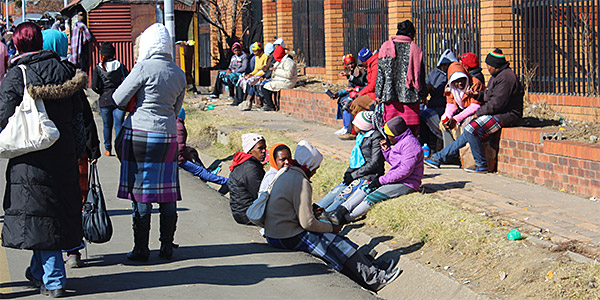
"You put that many people on the street, you're going to have a social revolution, you're going to have a political revolution," he said.
Lesiamo Molopo, an advisor with ReMmoho Compliance Solutions, which consults on labor compliance in Lesotho's garment factories, raised similar concerns. "If AGOA goes, there will be a domino effect through our economy," he said, adding that factory closures would eliminate both the informal jobs that have sprung up around the garment industry and the buying power of factory workers, which trickles down into other parts of the economy.
For women like Mamoleboheng Mopooane, a widowed mother of two teenagers, the loss of AGOA could mean inability to pay her children's school fees or support unemployed family members back home. AGOA's impact on her life, she explained, has not always been dramatic - her family still shares a single room, and sometimes called on payday loan companies for emergency cash - but it has been essential.
"We have nothing to do with these politics, but we will be in big trouble if this thing goes," she said. "We do this work to have bread, to have butter."


